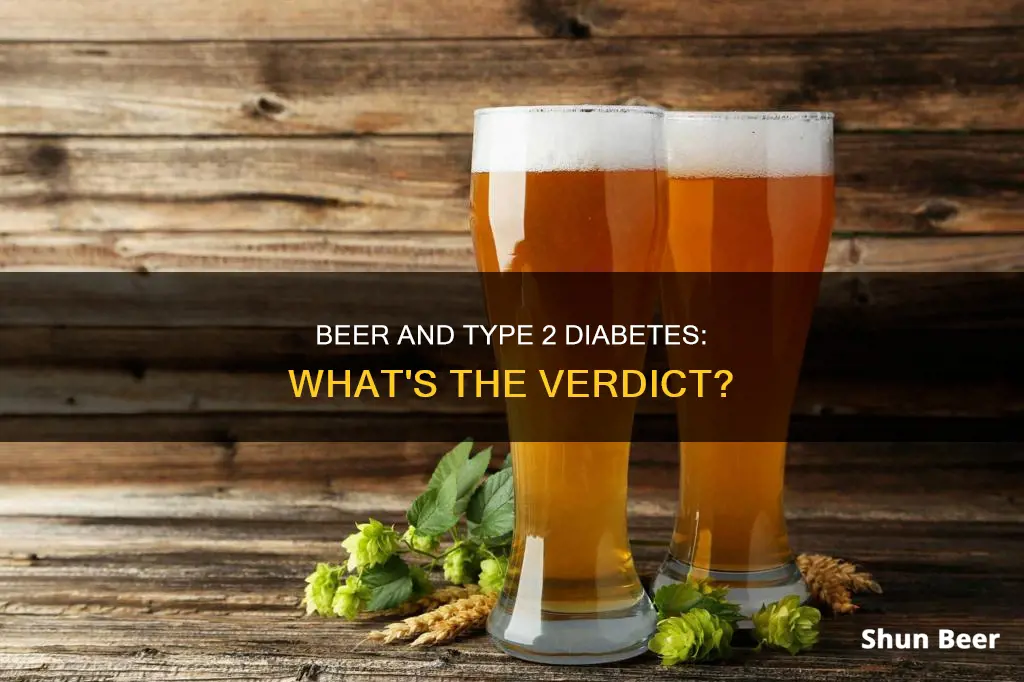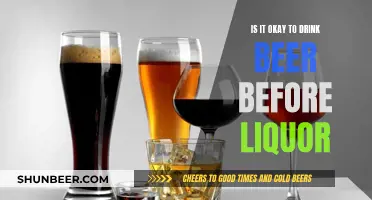
People with type 2 diabetes can usually drink beer, but it's not without risks. Alcohol can affect blood sugar levels, so it's important to be mindful of how much you're drinking and to consume it alongside food. The general alcohol consumption recommendation for people with type 2 diabetes is the same as for the general population: no more than one drink a day for women and up to two drinks a day for men.
| Characteristics | Values |
|---|---|
| Can people with type 2 diabetes drink beer? | Yes, but in moderation. |
| How much is too much? | No more than one drink a day for women and up to two drinks a day for men. |
| How does beer impact blood sugar levels? | Beer is a significant source of carbohydrates, so it can impact blood sugar. |
| What are the risks of drinking with type 2 diabetes? | Hypoglycemia (low blood glucose). |
| What are the benefits of drinking with type 2 diabetes? | Alcohol can lower blood sugar and increase the amount of good cholesterol (HDL) in the blood. |
What You'll Learn
- Beer is a source of carbohydrates and can impact blood sugar levels
- Drinking beer may lead to weight gain due to its calorie content
- Alcohol can interfere with the liver's ability to maintain blood sugar levels
- Drinking on an empty stomach can increase the risk of hypoglycemia
- Beer is higher in carbs than wine or liquor

Beer is a source of carbohydrates and can impact blood sugar levels
Beer is a staple beverage for many, but it is important to understand how it can affect your health, especially if you have type 2 diabetes. Beer is a significant source of carbohydrates, with an average 12-ounce can containing about 13 grams of carbs. This is nearly one carb serving, which is defined as 15 grams of carbs for carb-counting purposes. As a result, beer can significantly impact blood sugar levels and must be treated accordingly.
When you have type 2 diabetes, your body struggles to get sugar into your bloodstream for your cells to use. This can lead to hyperglycemia, a state where your blood has too much sugar, which can damage organs and body tissues. Drinking alcohol can cause hypoglycemia, or low blood sugar, because your liver, which stores and releases glucose, is also responsible for clearing alcohol from your system. This means that drinking alcohol can delay the release of necessary sugars into the bloodstream.
The impact of beer on blood sugar levels is particularly relevant for people with type 2 diabetes. The liver, where glucose is stored, also prioritises clearing alcohol from the body. This means that drinking alcohol can slow down carbohydrate metabolism, potentially leading to low blood sugar. Additionally, drinking any alcohol while taking diabetes medications can exacerbate this effect. Therefore, it is crucial to be mindful when consuming beer or other alcoholic beverages if you have type 2 diabetes.
The number of carbohydrates in beer varies depending on the type. "Light" beers tend to have the fewest carbohydrates, usually five grams or less per serving, and are also lower in alcohol content. On the other hand, hoppy craft beers like IPAs and stouts tend to be much higher in carbs, typically containing 15 grams or more per serving. They are also generally higher in calories and alcohol content, so it is recommended to stick to just one serving of these beers.
While beer can be a source of carbohydrates, it is important to note that it also contains very small amounts of vitamins and minerals such as B vitamins, calcium, magnesium, and phosphorus. However, drinking beer may contribute to weight gain over time due to its high calorie content. Therefore, if you have type 2 diabetes, it is essential to drink beer in moderation and be mindful of its impact on your blood sugar levels.
Beer and Mono: Is It Safe to Drink?
You may want to see also

Drinking beer may lead to weight gain due to its calorie content
Beer is a staple beverage for many, but it's important to be aware of its nutritional content, especially if you have type 2 diabetes. Beer is a significant source of carbohydrates, and depending on the type, it can also be high in calories. A 12-ounce can of beer typically contains 13 grams of carbohydrates. While beer also contains small amounts of vitamins and minerals, its calorie content can contribute to weight gain over time if consumed in excess.
The calorie content of beer varies depending on the type and brand. For example, "light" beers tend to have fewer carbs, usually five grams or less per serving, and a lower alcohol content. On the other hand, hoppy craft beers like IPAs and stouts tend to be much higher in carbs, often containing 15 grams or more per serving. They also tend to be higher in calories and alcohol content. Therefore, it's generally recommended to stick to just one serving of these higher-calorie beers.
It's worth noting that beer cans and bottles often don't have nutrition fact labels, making it challenging to know the exact calorie and carb content. However, you can find nutritional information for some major beer brands on websites like CalorieKing.com.
When it comes to weight management, it's not just the beer itself that matters, but also what you mix it with or consume alongside it. Beer is often enjoyed with calorie-dense snacks or meals, which can further contribute to weight gain if not balanced with a healthy diet and regular exercise.
Additionally, drinking beer or any alcoholic beverage can affect your judgment and lower your inhibitions, making it easier to overeat or make less healthy food choices. This is especially true if you drink on an empty stomach, as alcohol can impair your body's ability to regulate blood sugar levels effectively.
If you have type 2 diabetes, it's crucial to monitor your blood sugar levels and be mindful of the impact that beer and other alcoholic beverages can have. While you may not need to cut out beer completely, moderation is key. Sticking to the recommended serving sizes and drinking in moderation can help you enjoy beer while managing your weight and diabetes effectively.
Mixing Beer and Rum: Safe or Not?
You may want to see also

Alcohol can interfere with the liver's ability to maintain blood sugar levels
Furthermore, drinking alcohol on an empty stomach can exacerbate the risk of hypoglycaemia. Alcohol is absorbed directly into the bloodstream from the stomach or small intestine and then carried to the liver. If there is no food in the stomach, the alcohol will be absorbed more quickly, interfering with the liver's ability to regulate blood sugar levels. This is why it is recommended to drink alcohol with food or to have a snack while sipping.
The effects of alcohol on blood sugar levels can last up to 24 hours after drinking, so it is important to continue monitoring blood sugar levels during this time. Additionally, drinking in moderation and staying within government guidelines is recommended to minimise the risks associated with alcohol consumption. For people with type 2 diabetes, this typically means no more than one drink per day for women and up to two drinks per day for men.
Old Beer: Is It Safe to Drink After a Year?
You may want to see also

Drinking on an empty stomach can increase the risk of hypoglycemia
The risk of hypoglycemia is particularly significant for people with type 2 diabetes, as they already have higher blood glucose levels. When drinking alcohol, it's crucial for those with type 2 diabetes to be mindful of this risk and take necessary precautions. Here are some important considerations:
- Timing: The risk of hypoglycemia can last up to 24 hours after drinking alcohol. Therefore, it's essential to monitor blood sugar levels not only during drinking but also in the hours afterward.
- Food: Drinking on a full stomach is always advisable. Eating slows down the absorption of alcohol into the bloodstream, giving the liver more time to regulate blood sugar levels. It's recommended to have a snack or a meal while drinking or immediately beforehand.
- Blood Sugar Management: Keeping track of blood sugar levels before, during, and after drinking is crucial. This can help identify any drops in blood sugar and allow for timely intervention.
- Medication: If you are taking insulin or other medications that affect blood sugar levels, consult your healthcare provider. Certain medications can increase the risk of hypoglycemia when combined with alcohol.
- Symptoms: It can be challenging to distinguish between hypoglycemia and intoxication, as they share some symptoms. Signs of hypoglycemia include shakiness, dizziness, and fainting. If you experience any of these symptoms, it's important to treat low blood sugar immediately.
In conclusion, drinking on an empty stomach can indeed increase the risk of hypoglycemia, especially for those with type 2 diabetes. To mitigate this risk, it's essential to drink responsibly, preferably with food, and closely monitor blood sugar levels. Consulting a healthcare professional before drinking is always advisable, especially for those with type 2 diabetes, to ensure safe alcohol consumption.
Beer and Rectal Bleeding: Is There a Link?
You may want to see also

Beer is higher in carbs than wine or liquor
If you have type 2 diabetes, you may be wondering if it's safe to drink beer. Beer is typically higher in carbs than wine or liquor, but that doesn't necessarily mean it's off the menu for people with type 2 diabetes. Here are some things to consider:
The Carb Content of Beer
Beer is usually higher in carbs than other alcoholic drinks like wine or liquor, but the carb content can vary widely depending on the type of beer. "Light" beers tend to have the fewest carbs, typically 5 grams or less per serving, and are also lower in alcohol content. On the other hand, hoppy craft beers like IPAs and stouts tend to be much higher in carbs, typically with 15 grams or more per serving. They also tend to be higher in calories and alcohol content, so it's best to stick to just one serving if you go for these options. It's worth noting that beer cans and bottles don't always have nutrition labels, so it can be tricky to know the exact carb count.
How Beer Affects Type 2 Diabetes
While people with type 2 diabetes don't need to cut alcohol out completely, there are some important safety considerations. Alcohol interferes with the liver's ability to produce glucose when blood sugar is low, which can lead to dangerously low blood sugar levels (hypoglycemia) for up to 24 hours after drinking. This effect is particularly relevant for people with type 2 diabetes who are on insulin or other anti-hyperglycemic medications. To prevent hypoglycemia, it's recommended to not drink on an empty stomach and to monitor your blood sugar levels while drinking and in the following 24 hours.
Alternative Drink Options
If you're looking for alcoholic drinks with fewer carbs, spirits like gin, vodka, and whiskey are typically carb-free, as long as they are not mixed with sugary juices or tonic water, which are high in carbs. When it comes to wine, dry wines tend to have lower carbohydrate levels than sweeter wines. A standard glass of dry wine (200ml) typically has 1-2 grams of carbohydrates, while a sweet wine might have over 10 grams.
Drinking Guidelines for People with Type 2 Diabetes
It's important to follow drinking guidelines to minimise the risks associated with alcohol consumption, especially if you have type 2 diabetes. The general recommendation is no more than one drink per day for women and up to two drinks per day for men. Binge drinking is strongly discouraged for health and safety reasons. It's also important to be aware of the other health risks associated with excessive alcohol consumption, such as raised blood pressure, nerve damage, dehydration, and an increased risk of certain cancers and heart disease.
Beer and Pregnancy: Can Drinking Beer Affect Fertility?
You may want to see also
Frequently asked questions
Yes, but in moderation. It is recommended that women have no more than one 12-ounce beer per day, and men have no more than two.
Drinking beer can lead to hypoglycemia (low blood sugar) because the liver, which is responsible for clearing alcohol from the body, also releases stored glucose into the bloodstream when the body needs energy. If you are taking insulin or other medications for diabetes, drinking beer can lead to dangerously low blood sugar for up to 24 hours after drinking.
Some studies suggest that light drinking may be beneficial for people with type 2 diabetes. For example, drinking alcohol in moderation has been linked to an increase in good cholesterol (HDL) in the blood, which may help lower the risk of heart disease.
It is important to drink in moderation, choose low-sugar and low-carb beverages, never drink on an empty stomach, and monitor your blood sugar levels before, during, and after drinking. It is also a good idea to carry a form of identification that states you have diabetes, in case of a medical emergency.







